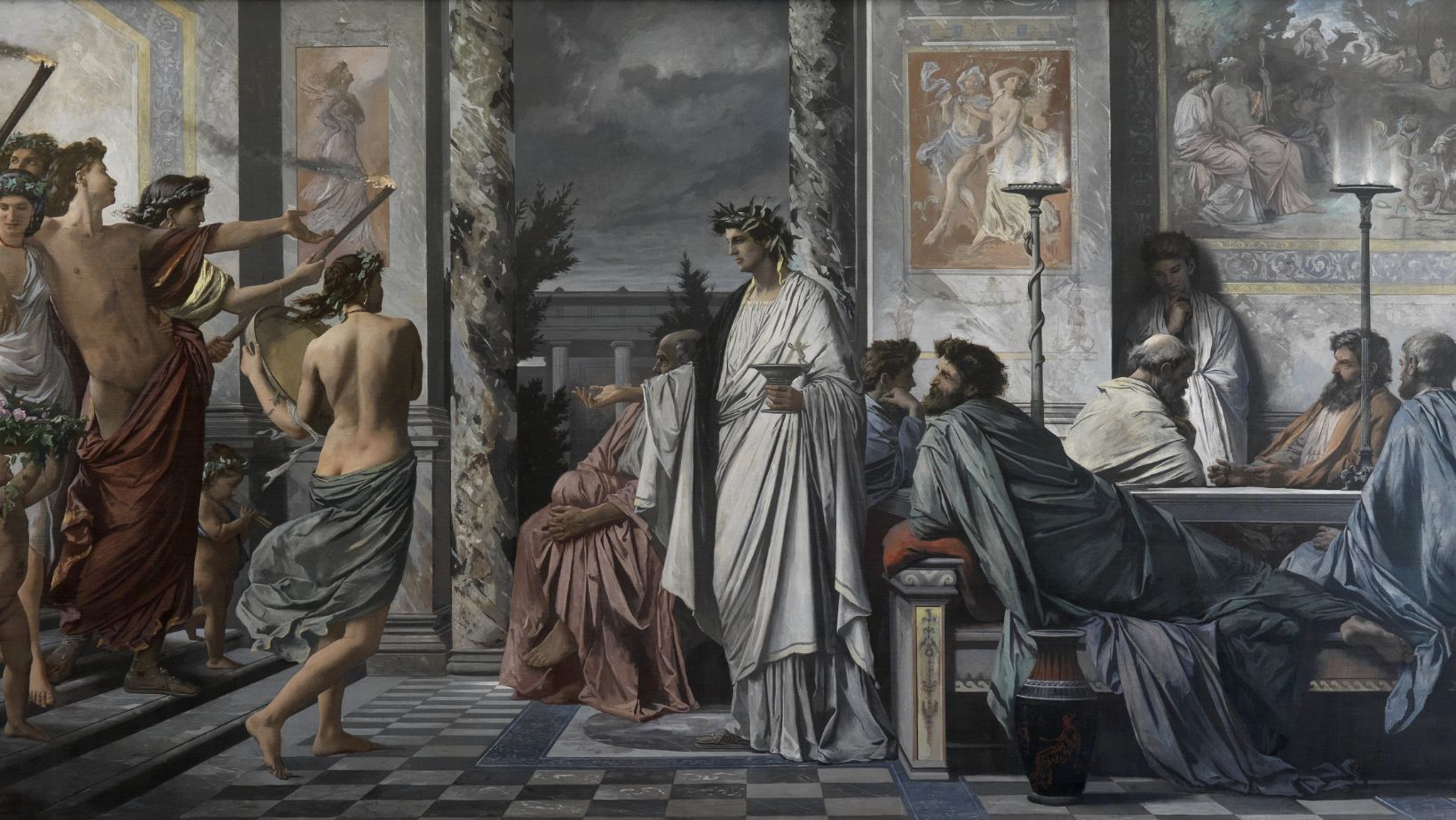Welcome! If you’ve ever wondered about the complexities of love, you’re not alone. For centuries, philosophers have pondered what it means to cherish someone truly. Among these thinkers, one dialogue stands out: Plato’s Symposium. So, we’re not just talking about any philosophical musings here; we’re getting right into the heart of what love means. By listening to speeches from some of the most brilliant folks in Athens, we glimpse their thoughts on life’s big journey.
But why should we care about an ancient drinking party? Because at its heart, Plato’s Symposium is more than historical chatter over wine; it offers timeless insights into human connections and desires that are as relevant now as they were back then.
Table of Contents:
- Overview of Plato’s Symposium
- The Speeches on Love
- Socrates and Diotima’s Perspective
- The Significance of the Symposium
- Key Quotes and Passages
- Conclusion
Overview of Plato’s Symposium

Plato’s Symposium is a game-changer. This philosophical dialogue dives deep into the topic of love in a unique way.
Picture this: many ancient Greek thinkers gathered for a drinking party. But instead of just getting wasted, they decide to have a little friendly competition. Each person has to give a speech praising Eros, the god of love.
Now, a “symposium” in ancient Greek literally meant a drinking party. But Plato took this occasion and turned it into something more—a philosophical exploration of love.
There’s no hard evidence that this symposium took place. Some scholars think Plato may have invented the whole thing or embellished the details. But that’s beside the point. What matters is the artistic way Plato structures this discourse on love.
Main themes and ideas: Plato’s Symposium
The Symposium is hands down the most influential work on love in Western literature. Its insights have shaped ideas about love at every level of culture, from medieval mysticism to Freudian psychology.
What are these groundbreaking ideas? Well, there’s the notion that beauty and goodness are one and the same. That love progresses in stages, like climbing a ladder to personal immortality. And that love is a universal creative force, something almost sacred.
Structure and format of the dialogue
More than any other dialogue of Plato, the Symposium reads like a full-blown drama. It has a three-act structure, with an introduction, interludes, and an epilogue.
The intro sets the scene, the main event is a series of verbal showdowns between the characters, and the epilogue caps it off with the arrival of a drunken party crasher. It’s a lively, humorous, thought-provoking conversation – not just a dry philosophical treatise.
The Speeches on Love: Plato’s Symposium
In the Symposium, each person takes turns making a speech praising love. It’s like a rhetorical relay race, with each speaker building on (or tearing down) the arguments of those who came before.
Phaedrus begins by waxing poetic about how love ennobles both the lover and the beloved. He sees love as this inspirational force that compels people to be their best selves.
Pausanias’ distinction between heavenly and shared love
Pausanias takes a more nuanced view. He argues there are two kinds of love – the “heavenly” love of the mind and soul and the “common” love of the body. Heavenly love is superior, in his book.
Next up is Eryximachus, who extends the concept of love to the natural world and the arts. He sees love as a balancing force, creating harmony in bodily health and musical rhythm.
Aristophanes’ myth of the origin of love: Plato’s Symposium
Then we have Aristophanes, the famous comic playwright. He spins a fantastical myth about how humans were once two-headed, four-armed, four-legged creatures. When Zeus split them in half, love arose as the desire to reunite with one’s missing half.
Agathon’s praise of love’s qualities
Agathon, the host of this symposium, gives a flowery speech praising love’s youthful beauty, delicacy, and virtue. It’s over-the-top, and Socrates can’t resist taking him down a peg.
Socrates and Diotima’s Perspective: Plato’s Symposium
Ah, Socrates. You can always count on him to shake things up. In the Symposium, he recounts a conversation with a wise woman named Diotima, who taught him the truth about love.
But first, Socrates has to humble Agathon a bit. Through his signature method of questioning, he gets Agathon to admit that his flowery speech was more style than substance.
Diotima’s ladder of love

Then Socrates shares Diotima’s concept of the “ladder of love.” This idea is that love progresses in stages, from attraction to physical beauty to appreciation of beauty in general to love of wisdom and truth.
Diotima argues that by climbing this ladder, humans can achieve a sort of immortality—not the literal immortality of the gods, but the metaphorical immortality of leaving a lasting legacy.
For Diotima (and Plato), the ultimate object of love is Beauty with a capital B. This eternal, unchanging Form of Beauty is the source of all the beauty we perceive in the world. It’s what truly satisfies the human soul.
Love as a mediator between the mortal and divine: Plato’s Symposium
Diotima sees love (or eros) as this intermediary force between the mortal and divine realms. It propels us to seek beauty, wisdom, and goodness—to partake in the eternal even though we’re trapped in finite human bodies.
This is the kicker of Socrates’ speech, the climax of the Symposium. And it’s delivered secondhand via a woman who’s not even at the party. Talk about a narrative twist.
Key Takeaway: Plato’s Symposium
Plato’s Symposium turns a drinking party into an epic discussion on love, introducing timeless ideas that still shape our understanding today. It blends drama with deep philosophical insights, exploring love’s power to inspire and elevate us toward eternal beauty.
The Significance of the Symposium: Plato’s Symposium
Plato’s Symposium is a treasure trove of insights into ancient Greek culture and society. Peeking through this lens offers us a glimpse into what they hold dear, how they live, and the principles that guide them.
The dialogue focuses on a topic central to the human experience then, just as it is now: love. Through the speeches of the various characters, we get a glimpse of how the ancient Greeks thought about and experienced this fundamental human emotion.
Yet, the real magic of the Symposium isn’t just trapped in history books. Its influence on Western philosophy and literature cannot be overstated.
The ideas explored in the dialogue—the nature of love, the pursuit of beauty and truth, and the connection between the physical and the spiritual—have resonated with thinkers and artists for centuries. The Symposium has been a wellspring of inspiration from the Neo-Platonists to the Romantics.
Relevance to modern understanding of love and relationships
Perhaps most remarkably, the insights of the Symposium remain profoundly relevant to our modern understanding of love and relationships. The questions it raises are: What is love? What is its purpose? How does it relate to our search for meaning and fulfillment? – are as pressing today as they were in Plato’s time.
In an age where we often reduce love to swipes on a dating app, the Symposium reminds us of the profound depth and complexity of these most human experiences. It challenges us to think more deeply about the role of love in our lives and society.
Through its portrayal of the god Eros, the dialogue also points to the transcendent, even mystical dimensions of love. This idea brings us closer to the thought that we might find a hint of something bigger, maybe even divine, within our most profound personal relationships.
Even though the Symposium comes from a specific time and place, its discussions and insights strike a chord that resonates through the ages. It taps into something universal in the human experience, which continues to resonate throughout the centuries.
So, the Symposium isn’t just an old text or a deep dive into philosophy. It’s a living, breathing work that still has the power to move us, make us think, and enrich our understanding of ourselves and our world.
Perhaps that is the greatest testament to its enduring significance. In grappling with the mysteries of love, the Symposium invites us into a conversation that is as old as humanity itself—and as fresh and vital as ever.
Key Quotes and Passages
There are so many memorable quotes and passages in the symposium that it’s hard to know where to start. Each speech is a gem in its own right.
“Love is born into every human being; it calls back the halves of our original nature together; it tries to make one out of two and heal the wound of human nature.” – Aristophanes, 191d
I mean, wow. In one poetic flourish, Aristophanes captures the essence of romantic love—that deep yearning for wholeness, connection, and healing.
Then there’s this mind-bending passage from Diotima via Socrates:
“He who would proceed rightly in this matter should begin in youth to turn to beautiful forms; and first, if his instructor guide him rightly, he should learn to love one such form only – out of that he should create fair thoughts; and soon he will himself perceive that the beauty of one form is truly related to the beauty of another; and then if beauty in general is his pursuit, how foolish would he be not to recognize that the beauty in every form is one and the same.” – Diotima, 210a-b
This is the crux of the famous “ladder of love” – the idea that love and attraction can lead us from appreciating physical beauty to contemplating beauty itself, in all its abstract and eternal glory.
“By a singular piece of good fortune, then, I have found you in the same condition as myself, and I need not be ashamed of saying what I have to say.” – Socrates, 172B
Classic Socratic irony – he’s saying, “Well, fancy that, we’re both equally clueless.” It’s a great reminder not to take ourselves too seriously, even when discussing heart matters.
Key Takeaway: Plato’s Symposium
Plato’s Symposium dives deep into love, showing it as a quest for wholeness and truth that still speaks to us today. It challenges us to see beyond superficial views of love, offering timeless insights into our deepest connections.
Conclusion: Plato’s Symposium
In our journey through Plato’s Symposium, we’ve traversed from myths to logic and landed somewhere between understanding and wonderment. We started with questions—what is love? How do we define it? While answers varied from speaker to speaker within the symposium itself, one truth emerged crystal clear—love shapes us in ways nothing else does.
This exploration has shown us that whether draped in myth or wrapped in intellectual discourse, the pursuit of understanding love remains eternal.

